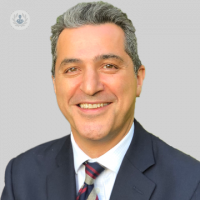How is IBD diagnosed and managed?
Escrito por:Inflammatory bowel disease, or IBD, is a chronic condition that affects a large chunk of the world’s population. In this article, esteemed consultant colorectal and general surgeon, Mr Amir Darakhshan, discusses the disease at length.

What is IBD? What are the associated symptoms?
IBD stands for inflammatory bowel disease. It is a chronic illness. Symptoms of IBD can be quite varied. The disease can affect any part of the bowel. The two main types of IBD are Crohn’s disease and ulcerative colitis. Typical symptoms include:
- abdominal pain
- diarrhoea with blood or pus
- bloated stomach
- reduced appetite
- weight loss
- mouth sores
- anal fistulas
- rectal bleeding
- changes in bowel habits
How is IBD diagnosed?
Patients will typically present with rectal bleeding, changes in bowel habits, diarrhoea, and/or abdominal pain. In order to diagnose IBD, a series of blood tests may be carried out if deemed necessary. Endoscopies, colonoscopies, and gastroscopies are all also carried out in the diagnostic process. MRI or CT scans are also occasionally required.
What causes IBD?
We don’t really know what causes inflammatory bowel disease. There may be some associations with diet, environmental factors, and lifestyle. There is also an element of predisposition involved.
Can IBD be cured?
It is a chronic condition. Ulcerative colitis, through surgical removal of the bowel, can be cured. Crohn's disease, though, is not a condition that can be cured, but can be controlled effectively. Patients can live a normal life with only a few symptoms.
Through a combination of medication and surgery, where the diseased bowel has been removed, patients can then often return to having a good quality of life. In some severe cases, one’s large bowel needs to be surgically removed.
If one’s large bowel (that has been affected by IBD) has been removed in its entirety, then, in effect, this patient will be cured of the ulcerative colitis form of IBD. Having said that though, the inflammation caused by IBD does not always only present itself in the bowel. Thus, some patients may exhibit inflammatory disease outside of the bowel. Joints, skin, and the eyes are typically the body parts affected.
How successful are the medical treatments for IBD?
This will depend on whether it is Crohn’s disease or ulcerative colitis. When we talk about ulcerative colitis, medicative treatment can control the disease, without curing it for good. In other words, symptoms are kept to a minimum through medication.
Surgical removal of the large bowel, as mentioned, is very successful in curing the ulcerative colitis disease. Patients are also offered the chance to remove their colon completely. For some, this option is not appealing, and so for these patients, there are other options available. One of these options involves joining the small bowel to a part of the rectum.
When it comes to Crohn’s disease, patients suffering from it will, at some stage, require an operation. We know that surgery will not cure the disease in patients with Crohn’s disease, so we will remove the affected/diseased part of the bowel, and then continue management of the Crohn’s disease with medical treatment.
Mr Amir Darakhshan is a highly revered consultant colorectal and general surgeon who specialises in inflammatory bowel disease. If you would like to book an appointment with him today, you can head on over to his Top Doctors profile today to do just that.


